Smoke shops do not bring prosperity
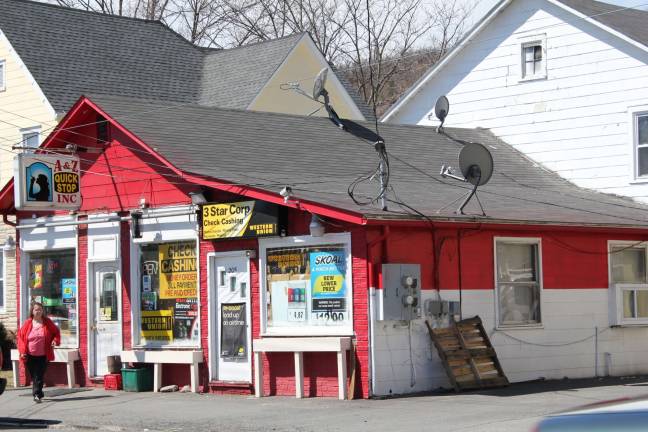
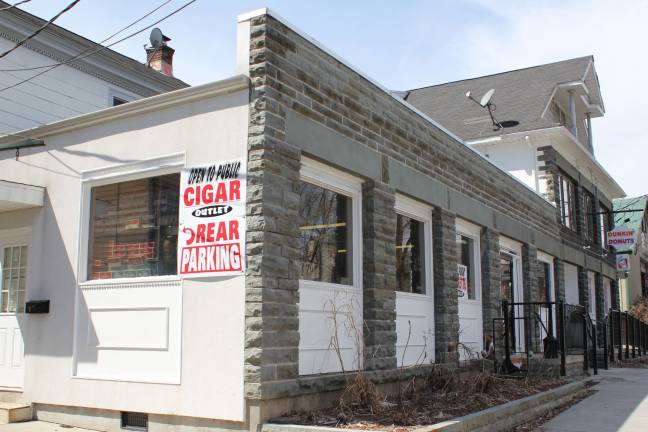
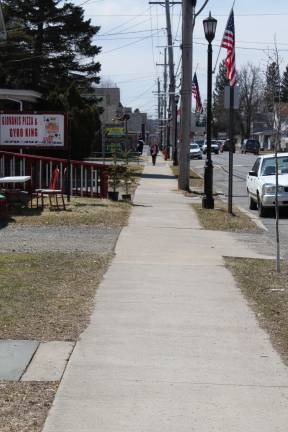
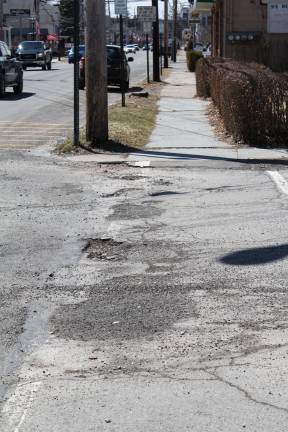
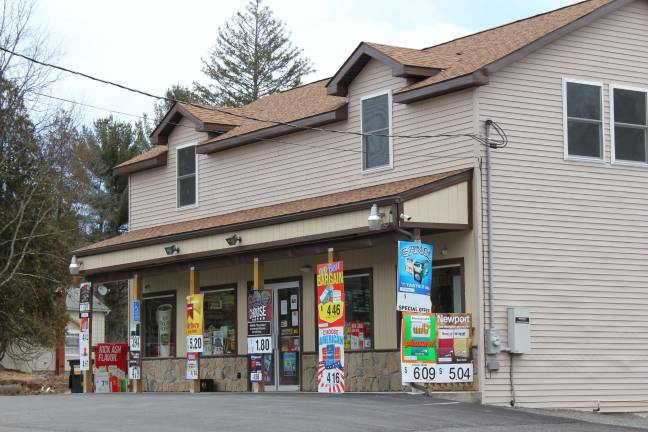
By Hema Easley
MATAMORAS — When the first couple of businesses opened up on Route 209 about 20 years ago, local residents were thrilled by the prospect of new stores dotting the main drag.
“They said 209 would become the Miracle Mile, the economy would pick up,” recalled Robert Ewbank, the former supervisor of Westfall.
Now many of the stores on Route 209 sell tobacco, and it’s not quite the miracle that residents hoped for. Many long-time residents no longer recognize the town they grew up in, the one with the drive-in theater and Polar Plunge ice cream store.
Tobacco central
It wouldn’t be a stretch to say that cigarette stores now make up about half the businesses in town. There are an estimated 50 stores selling cigarettes in Pike County, the majority of which are in Matamoras and Westfall. More than half of them sell only tobacco products, including e-juices, a liquid nicotine unregulated by the Food and Drug Administration that is mixed with flavors like cherry, vanilla and berry, and has the American Academy of Pediatrics alarmed.
“This is really a reflection on the governance of the area,” said a Courier reader who commented on last week's story about cigarette stores in the area and identified himself as M IIdico Mester. “Perhaps it's time to raise taxes on tobacco and fireworks, for both are needless, destructive and over-sold, under-regulated elements in a healthy society.”
Unlike neighboring New York or New Jersey, municipalities in Pike County and the county itself do not earn any sales tax from the sale of cigarettes or tobacco products. Under Pennsylvania law, sales tax goes to the state.
Westfall discussed a 0.5 percent tax on cigarette stores a couple of years ago, but the proposal went nowhere after a pushback from a large cigarette store owner and reluctance by Matamoras to do the same, said Ewbank. But even if the proposal had support, the township would have had to lobby for a special authorization by the general assembly.
Currently two Pennsylvania counties impose a cigarette tax — Alleghany and Philadelphia — and both needed state approval.
In the 2012-13 tax year, Pennsylvania earned $1.02 billion in sales tax from cigarettes. Pike County and its municipalities earned nothing.
In addition, the stores — like all commercial properties in the county — are taxed at the same rate per $1,000 of assessed value as homeowners. There is no difference between homestead and non-homestead rates in Pike, so a profitable smoke shop pays no more in property tax than homeowners who do not use their properties for profit.
A lower quality of life
Parents, students, school officials and some law enforcement officials have said they are concerned about the profusion of cigarette stores in the area, which they say has led to accidents and crimes, and lowered the overall quality of life in their towns. Scientists have long recognized that cigarettes raise the risk for later use of illicit drugs like marijuana and cocaine, a view backed by the National Institutes of Health.
A disconnect between officials and residents
But there appears to be a disconnect between local residents and their elected officials over how they view the smoke shops. The latter argue that tobacco stores may not be ideal but that they help the economy and provide much needed property taxes to municipalities. They also say the stores have spruced up the area and are running businesses in properties that would otherwise be vacant.
“While I know the effects of cigarettes are very harmful, and I do not advocate their use, it is important to remember that they are legal and the businesses that sell them have the right to operate, but we as consumers also have the right not to patronage those establishment,” County Commissioner Matt Osterberg said in an email. “While I am concerned with the use of tobacco products, I believe we as a society should be much more concerned with the increase addiction to opiates and prescription drugs. That is an issue that will destroy our community.”
Representative Mike Peifer (R-Monroe/Pike/Wayne) said he had heard from constituents concerned about the impact of tobacco stores on the community. But he said the government could not limit the number of tobacco stores in the county much in the same way it could not prevent a Walmart opening next to a Home Depot or a Lowe's.
“We live in a free market society,” said Peifer in a phone interview. “Right now smoking cigarettes is not illegal in the Commonwealth. All we can do is to educate our students and parents about the challenges and health effects of smoking.”
Peifer said there had been some discussions about imposing a “sin tax” on tobacco, much like the 24 percent tax the state imposes on alcohol, but he indicated that the idea hadn’t progressed. Elected officials were, however, considering options that would give local governments some options in taxation.
Pennsylvania currently imposes an excise tax of $1.60 on a pack of cigarettes and $16 on a carton paid for by the consumer. It also imposes a $6 sales tax on cigarettes and little cigars, which goes to the state.
Cost and benefit
Matamoras Mayor Janet Clark described a long-time vacant store that had abandoned cars in the parking lot, one of which had a tree growing through the hood. A smoke shop opened up at the location, and the store is now clean and occupied, and parking lot is spruced up.
That may be the case for a few tobacco stores, but on a recent drive along Pennsylvania Avenue, a reporter saw crumbling sidewalks and stores that could hardly be described as adding curb appeal to the business district. Most seemed rundown, and at least one had lots of broken glass in its parking lot.
It was also unclear how much money Matamoras and Westfall earned from property taxes. Tax collectors from both municipalities were said they did not know which property on the tax roll sold cigarettes.
“I don’t know what name they operate under,” said Laurie Pierce, the tax collector of Westfall, which has a large number of stores. “They don’t operate under the name on the building.”
A partial list gleaned from tax rolls in Matamoras showed that stores typically paid between $1,300 and $1,800 in property taxes to the borough, with some paying more and some less. Like all businesses, the tobacco stores also pay county and school taxes.
A couple of years ago Matamoras embarked on a sidewalk and street front improvement along Pennsylvania Avenue. Jane Drake, the tax collector for the town, sent a letter to all stores along the avenue asking them to chip in.
“We didn’t get one single dime” from the smoke stores, she said.
Now one side of Pennsylvania Avenue in Matamoras has paved sidewalks and American flags fluttering on poles. The other side has cracked sidewalks. The state will now pay to have the sidewalks fixed. Representatives Peifer and Rosemary M. Brown (R-Monroe/Pike) announced a $300,000 grant for Matamoras to install or replace curbs and sidewalks along Pennsylvania Avenue.
What other businesses think
Other businesses were cautious about commenting on the cigarette stores. But at least one conceded there seemed too many.
“I don’t think we need that many tobacco stores,” said Philly Ricardo, former president of the Pike County Chamber of Commerce and current treasurer who owns an insurance business. “It just seems other businesses have to jump through hoops to open, and these tobacco stores” just open up.
There are an estimated 888 businesses in Pike County, of which 134 are retail. Of these about 50 sell cigarettes and tobacco products.
None of the tobacco stores are members of the Chamber of Commerce
Mike Sullivan, executive director of the Pike County Economic Development Authority, said his job including attracting businesses to set up shop in Pike County. He is not involved in bringing retail stores to Pike, he said, and had no opinion on whether the glut of tobacco stores kept other businesses away or what their impact was on the community.
“It’s not something I think about or study,” said Sullivan. “It’s a non-issue for me, even personally.”
Ricardo, however, felt the stores didn’t reflect well on the county.
“It’s a negative connotation for the county,” she said. “I’d hate to have that define us.”